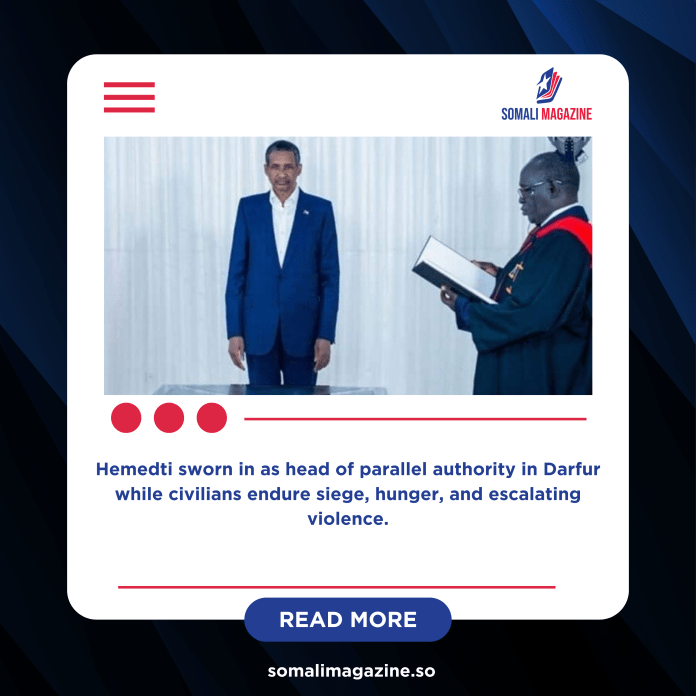Facebook Twitter (X) Instagram Somali Magazine - People's Magazine
Sudan’s war has taken a new and dangerous turn after Mohamed Hamdan Dagalo, widely known as Hemedti, was sworn in as the head of a parallel government. Hemedti is the commander of the paramilitary Rapid Support Forces (RSF), which has been fighting Sudan’s national army for nearly two and a half years.
The announcement was made in a statement by the RSF, which said the swearing-in ceremony took place in Nyala, one of Sudan’s largest cities located in the Darfur region. Reuters, however, could not independently confirm Hemedti’s presence there.
Nyala has become the de facto capital for the RSF, which has already appointed a prime minister and formed a presidential council under Hemedti’s leadership. On the same day of his swearing-in, the city came under drone attack, highlighting the ongoing battles in the region.
A Country Divided
The RSF currently controls most of Darfur in western Sudan, but fierce clashes continue in al-Fashir, the region’s historic capital. For more than 500 days, hundreds of thousands of civilians in al-Fashir have been trapped under siege, cut off from food and basic supplies. Many have been forced to survive by eating animal feed.
The humanitarian situation is worsening by the day. Earlier this week, UNICEF reported that more than 1,000 children have been killed or severely injured by bombings, artillery fire, and ground fighting. The RSF insists that civilians were given safe passages to leave, but independent reports suggest otherwise.
According to the Yale Humanitarian Lab, new satellite images show that the RSF has actually constructed physical barriers preventing people from leaving the city. Survivors who managed to escape said they faced violent attacks, robberies, and harassment from RSF fighters along the way.
The Army Strikes Back
While the RSF has strengthened its hold in Darfur, Sudan’s national army has regained control of the country’s central and eastern regions. The army recently formed its own government and held its first cabinet meeting since the start of the war.
The Kordofan region, which lies between RSF-controlled Darfur and army-controlled eastern Sudan, remains a major battlefield. Both sides continue to clash there, and villages have come under repeated attacks.
A Nation in Crisis
The power struggle between the RSF and the army has dragged Sudan into one of the world’s worst humanitarian disasters. Nearly half of Sudan’s 50 million people now face severe hunger. Millions have been displaced, the economy has collapsed, and essential services such as healthcare, education, and transport have been destroyed.
International aid groups warn that famine is looming, especially in besieged areas like al-Fashir. The conflict has also destabilized neighboring countries, as hundreds of thousands of refugees continue to flee across borders into Chad, South Sudan, and Egypt.
The Road Ahead
With both the RSF and the national army claiming to be Sudan’s legitimate government, the country is edging closer to de facto partition. The RSF has entrenched itself in Darfur with its own political structure, while the army is consolidating power in Khartoum and the east.
Diplomatic efforts by regional and international mediators have so far failed to stop the war. Meanwhile, ordinary Sudanese continue to suffer the consequences of a conflict that has turned once-thriving cities into battlefields and left millions struggling for survival.

